Centering Community: the Ilíiaitchik Indigenous Correspondents Storytellers Take the Stage at the 2025 Planet Forward Summit
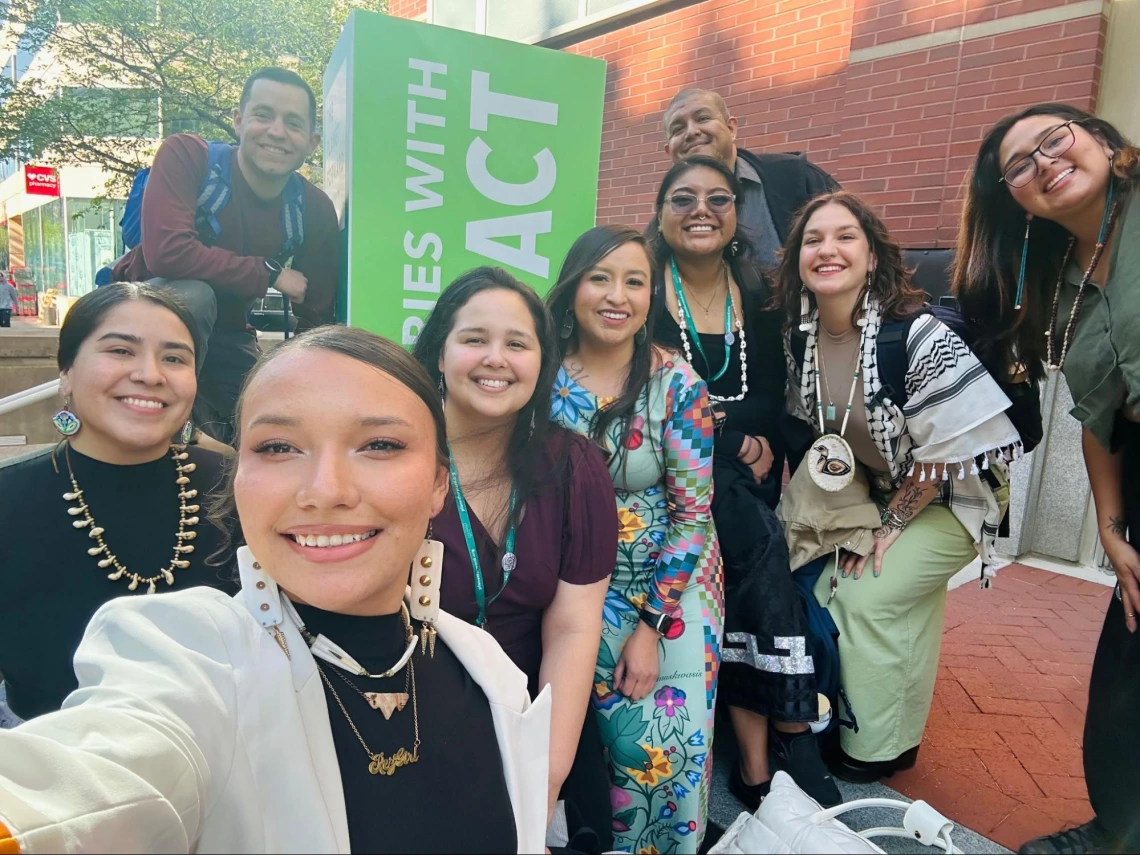
Above: Members of the ICP cohort and ICP support team pose at the entrance to the 2025 Planet Forward Summit.
Image courtesy of Taliyah Medicine Horse.
In April, participants in the 2024-2025 cohort of the Ilíiaitchik Indigenous Correspondents Program (ICP) gathered in Washington, DC, to learn and share their stories and perspectives at the Planet Forward Summit – a national convening of students, scholars, and other storytellers passionate about communicating environmental solutions to “move the planet forward.” The students’ visit followed ten months of participating in multimedia storytelling workshops led by Indigenous mentors, ranging from “Environmental Storytelling” led by award-winning National Geographic photographer Yiliii Yuyan (Nanai) to “Indigenous Knowledge and Science Communication” led by artist and professor Dr. Haliehana Alagûm Ayagaa Stepetin (Unangâx), as well as crafting and publishing an environmentally-focused story on a topic of their choice. After ten months of learning about (and practicing!) effective environmental communication techniques, the ICP students took to the Planet Forward Summit stage to share their expertise in community-based and culturally-grounded storytelling with fellow storytellers, engaged in workshops led by faculty and/or media experts both at the Summit and around DC, and celebrated with good food and even better company.
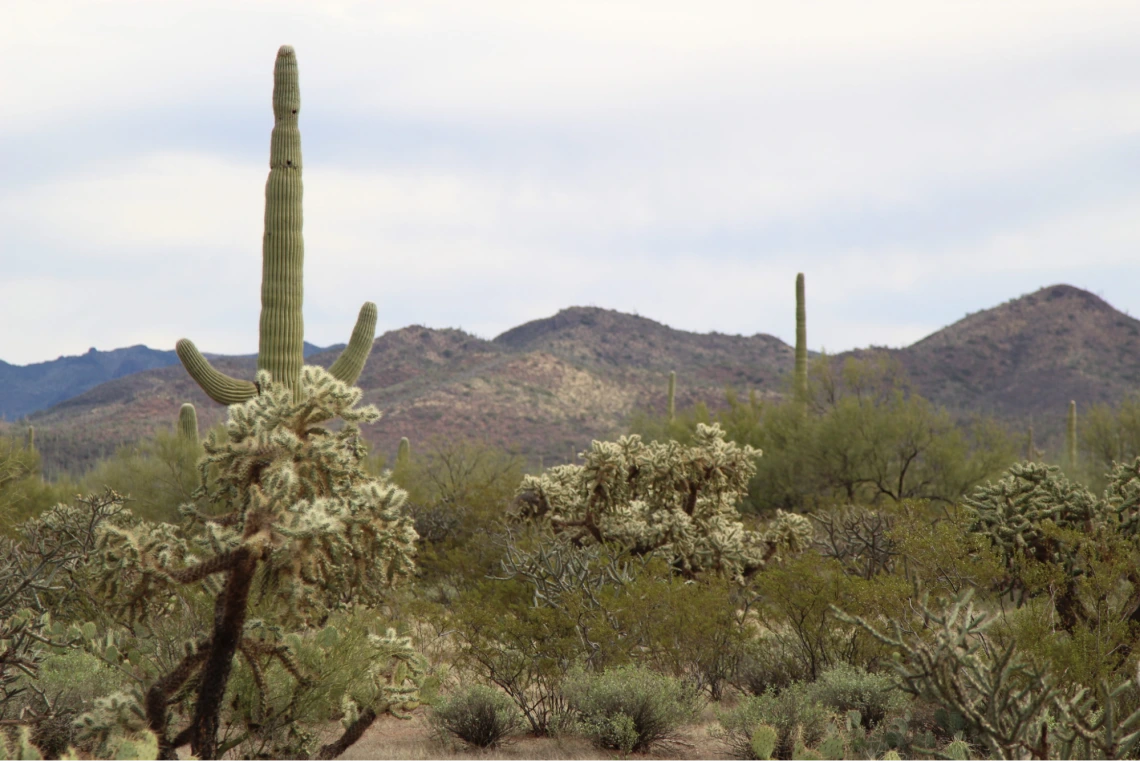
Above: A desert landscape featuring a Ha:sañ, standing against a backdrop of rolling mountains.
Image courtesy of Trinity Norris, as featured in her Planet Forward story “Bahidaj: An end to the beginning.”
This year the ICP students’ stories ranged from highlighting the work of Indigenous leaders who are advocating for Indigenous food sovereignty at the UN World Food Forum to detailing the importance of Bahidaj (saguaro cactus fruit) harvests within Tohono O’odham Nation. While the ICP students’ stories always cover diverse areas and topics, their stories always elevate innovative solutions that individuals and/or communities are implementing to continue to steward Lands, Waters, and build a better tomorrow for future generations.
In addition to celebrating the care and effort the students poured into their stories, we also cheered on four ICP students who were named Planet Forward Storyfest finalists at this year’s Summit. Storyfest is an annual national contest celebrating environmental storytelling that recognizes outstanding college student narratives that inspire, motivate, and drive change. The contest invites students to submit original context – including written articles, video documentaries, podcasts, and multimedia projects – which are judged by an independent panel of experts based on their originality, artistry, clarity, and impact.
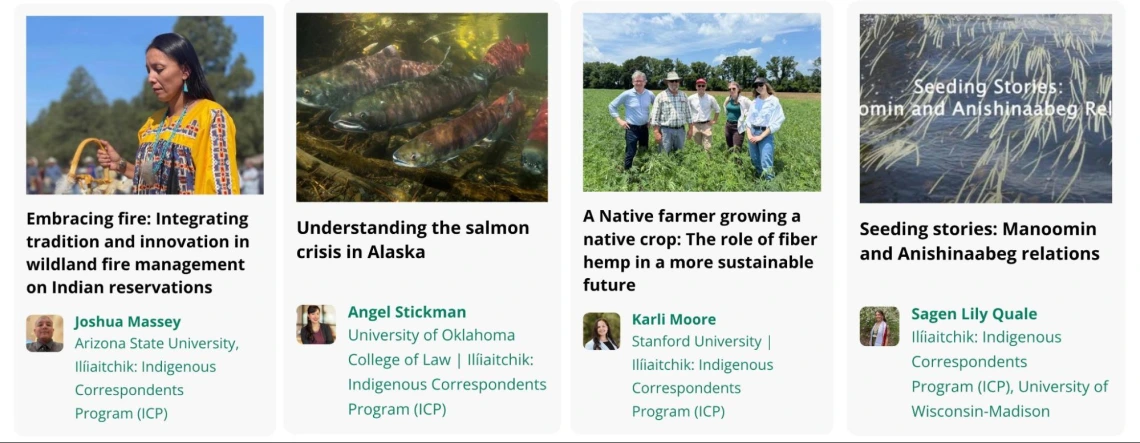
Above: ICP Correspondents’ stories that received nominations as finalists in the national 2025 Storyfest contest.
This year, four ICP students were named Storyfest finalists, including:
- Joshua Massey (White Mountain Apache Tribe) for “Best Written Story” with his "Embracing Fire: Integrating Tradition and Innovation in Wildland Fire Management” essay, which details traditional fire management practices allow Tribal communities to maintain culturally-relevant traditions while addressing climate-driven wildland fires.
- Sagen Lily Quale (Red Cliff Band of Lake Superior Ojibwe) in the “Best Short Video” category for her film "Seeding Stories: Manoomin and Anishinaabeg Relations" which explores the vital role of Manoomin (wild rice) to the ecology of the Great Lakes region and local Tribal Nations
- Angel Stickman (Native Village of Shungnak) in the “Best Social Media Video” category for her "Understanding the Salmon Crisis in Alaska” video, which highlights how rural Alaskan villages are facing food insecurities due to industrial salmon fishing.
Karli Moore (Lumbee Tribe of North Carolina) in the “Best Written Story” category for her "A Native Farmer Growing a Native Crop: The Role of Hemp in a More Sustainable Future" essay, which follows the work her father, Eddie Moore, who is working in collaboration with NC State University researchers to grow sustainable fiber hemp.
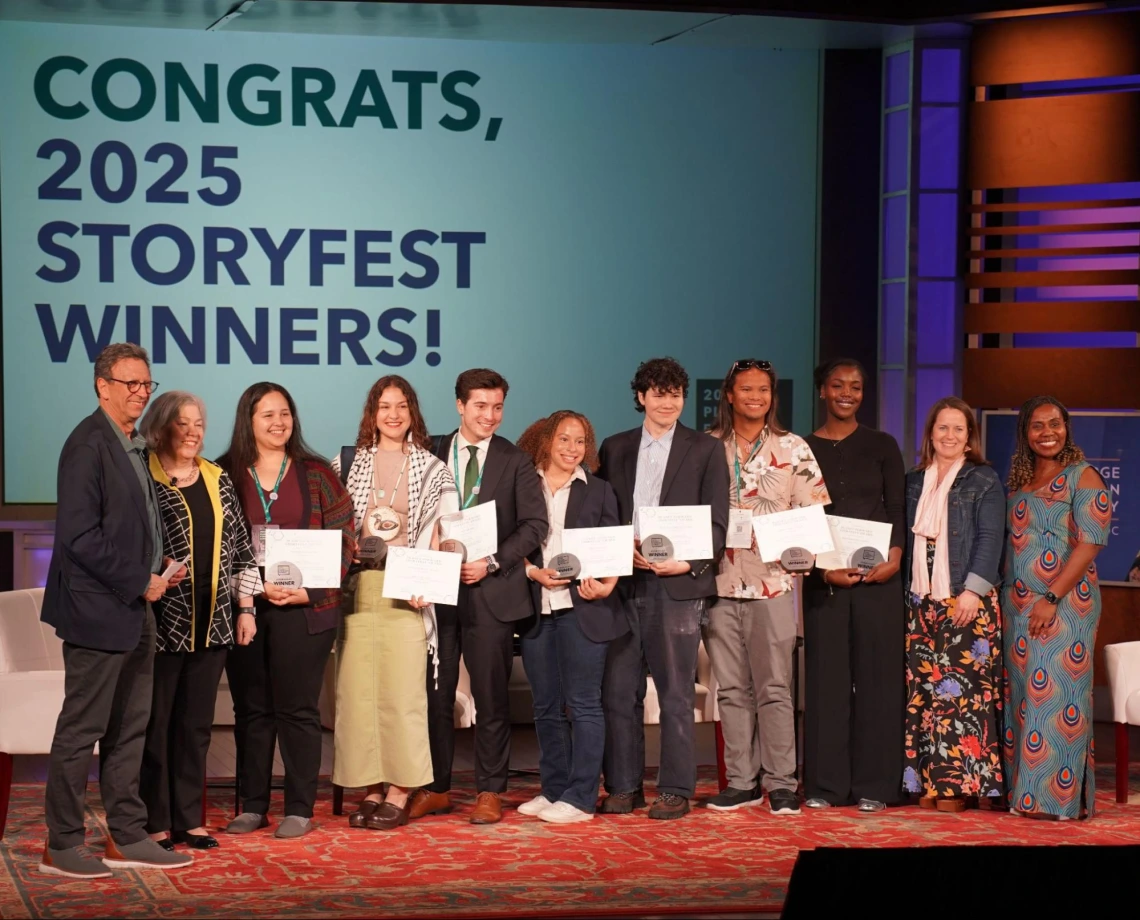
Above: ICP Correspondents Karli Moore (3rd from left) and Sagen Quale (4th from left) accept their Storyfest Contest awards at the 2025 Planet Forward Summit. Both students will be traveling on an environmental storytelling trip to the Galápagos Islands this summer.
Image courtesy of Torran Anderson.
Along with finalist nominations, we celebrated two students – Sagen Quale and Karli Moore – who won the “Fan Favorite” and “Spotlight Award” categories, respectively, earning them both spots on a Lindblad Expeditions environmental storytelling trip to the Galápagos Islands this summer! We look forward to hearing about Sagen and Karli’s experiences through the stories they’ll publish following this once-in-a-lifetime trip!
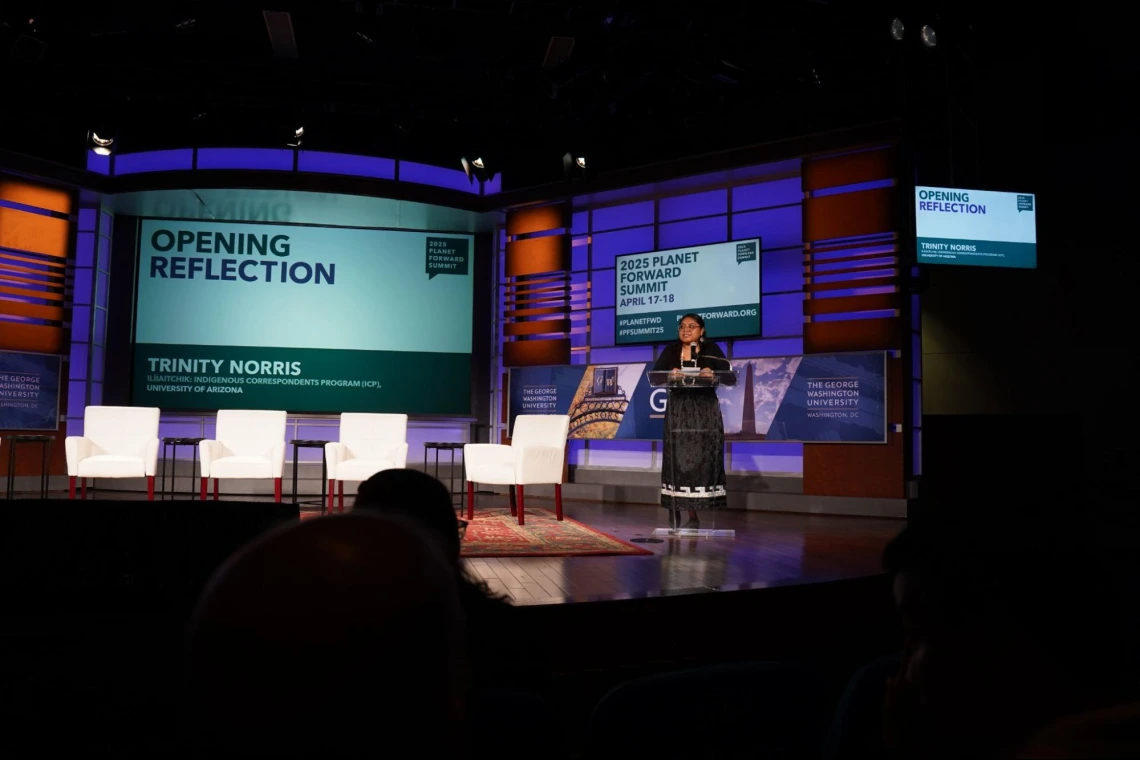
Above: ICP Correspondent Trinity Norris reflects on the importance of building community cohesion during the opening reflection at the 2025 Planet Forward Summit.
Image courtesy of Torran Anderson.
Trinity Norris (Tohono O’odham) reflected on the importance of unified responses to the climate crisis amid a particularly turbulent time during her opening remarks at this year’s Summit, noting “During a time when the challenges we face range from environmental crises to political tensions— it can feel more divided than ever... despite the divisions we face, we come together. We build bridges across those divides.” That spirit – of finding common purpose and building community - rang true throughout our week together, including during the ICP “Centering Communities” panel discussion, led by ICP Editor Ivey Camille Manybeads Tso (Diné).
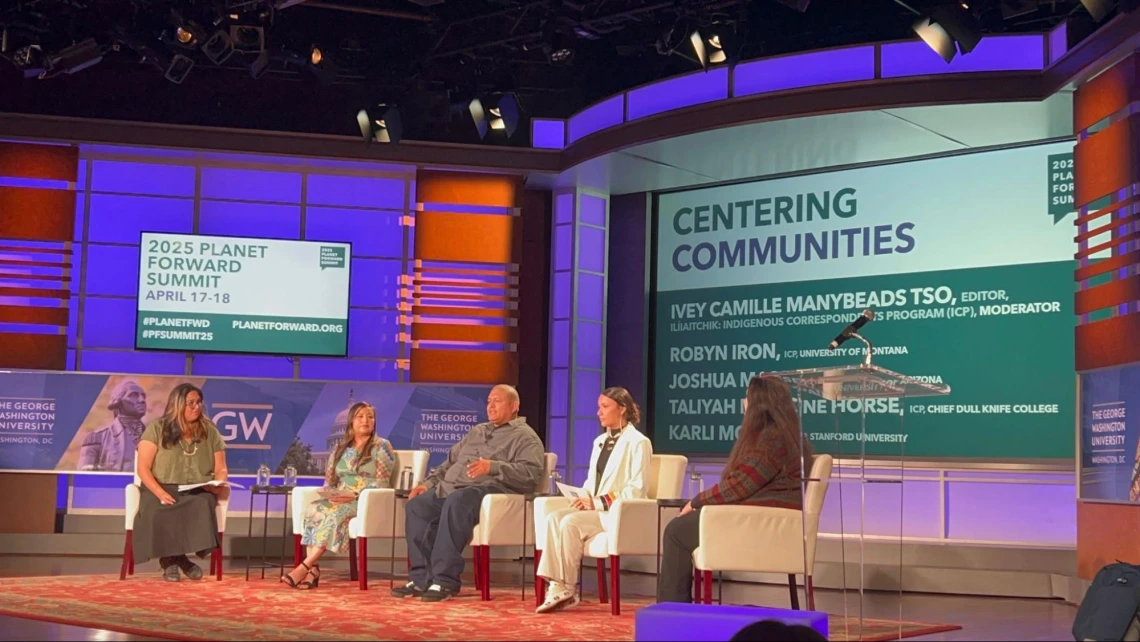
Above: ICP Correspondent Joshua Massey (pictured at center) speaks about his experiences working with communities to tell stories. In addition to studying Public Health at the University of Arizona, Joshua is a Professional Archaeologist and Fire Archaeologist (Wildland FireFighter/Resource Advisor) for the Bureau of Indian Affairs.
Image courtesy of Alexander Cotnoir.
The Indigenous Correspondents’ “Centering Communities” panel also featured correspondents Robyn Iron (Apsaalooké and Tsitsistas), Karli Moore, Joshua Massey, and Taliyah Medicine Horse (Tsétsėhéstȧhese and Apsáalooke) who shared how they navigate storytelling with respect and care to the communities they represent. They emphasized that ethical storytelling means not only seeking to tell nuanced stories, but also honoring the cultural protocols and lived realities of the people whose stories are told. Taliyah noted, “It’s important to collaborate with communities rather than going to them for information. Most of the time our communities get researchers coming to us and telling us that we need to do something or we need to tell our stories, but they never come to us and ask what we need to tell.” By sharing their storytelling practices, the ICP students sought to encourage their fellow storytellers to approach their work with humility, openness, and respect for Tribal sovereignty.
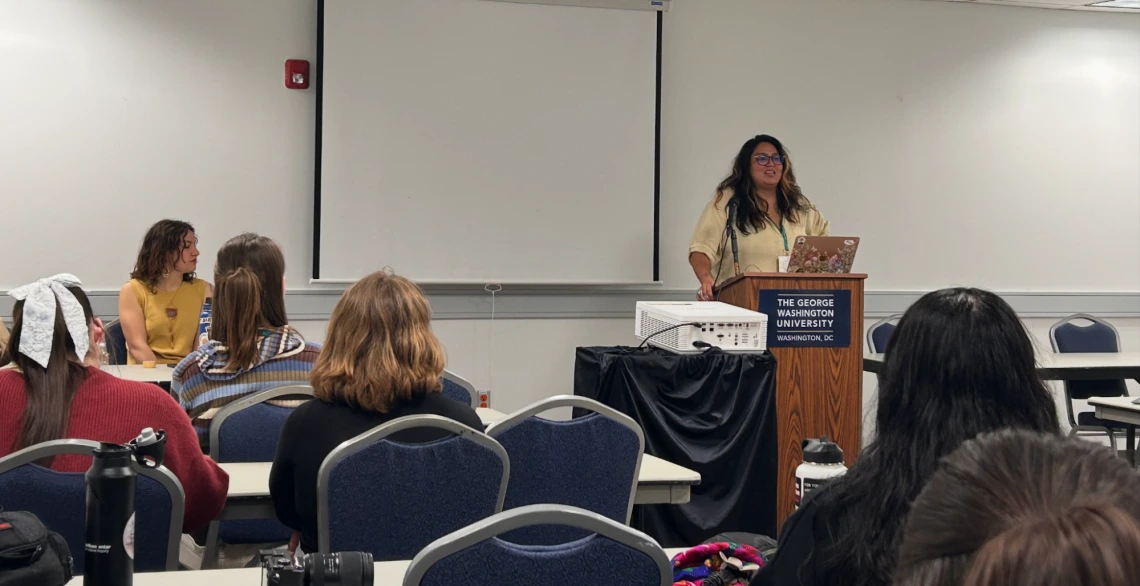
Above: ICP’s Story Editor/Mentor Ivey Camille Manybeads Tso (pictured right) and ICP Correspondent Sagen Quale discuss strategies for breaking away from antiquated, Western-dominant tropes in visual storytelling during their “Indinema: Ways to Promote Power in Storytelling” workshop.
Image courtesy of Alexander Cotnoir.
In the spirit of collaborative learning, Ivey Camille Manybeads Tso and Sagen Quale also facilitated one of this year’s communication workshops at the Summit titled “Indinema: Ways to Promote Power in Storytelling.” During the workshop, Ivey and Sagen shared strategies for how filmmakers can break from dated, Western-centric notions to bring “cultural storytelling alive and in frame.” Sagen shared how she used camera angles, lighting, and integrated local musical and wetland sounds in her film to help transport and orient viewers to the place and people she highlights within her work.
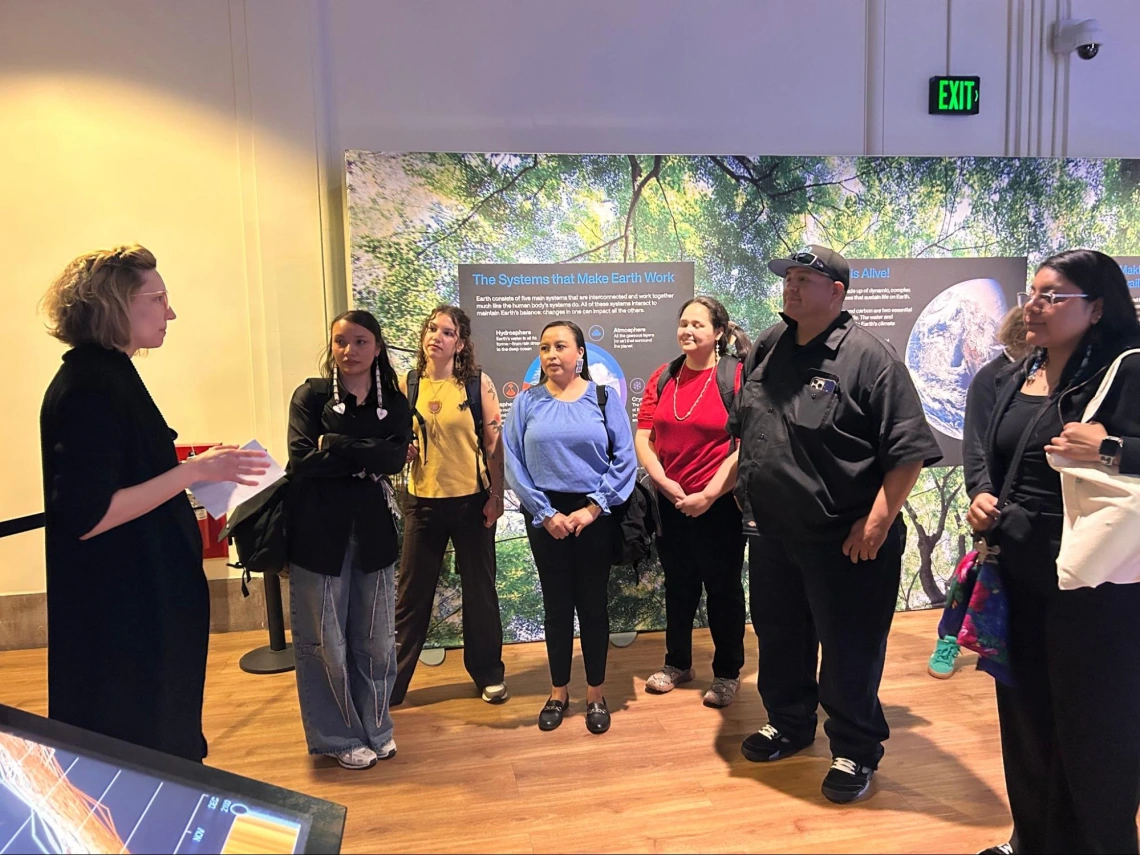
Above: Members of the Ilíiaitchik Indigenous Correspondents Program cohort and support team visited the NASA Earth Information Center at the Smithsonian National Museum of Natural History to learn about exhibit design and science writing.
Image courtesy of Alexander Cotnoir.
Outside of the Planet Forward Summit, ICP students and members of the ICP support team visited the National Museum of Natural History, where we toured the new NASA Earth Information Center and Lights Out: Recovering Our Night Sky exhibitions alongside members of the museum’s exhibit design, writing, and education teams. During the visit, we learned about the design process behind creating multimedia exhibitions that combine written text, art and photography, videos, sound, and digital interactives to create a cohesive and compelling story for visitors. We also learned about how the museum collaborates with local and Indigenous community members in ensuring their stories are up-to-date, accurate, and meaningful.
Each year, ICP’s culminating trip to Washington, DC is an incredible way to connect, learn, and celebrate the students who are inspiring leaders both in their classrooms and communities. Now entering its fourth year, the Ilíiaitchik Indigenous Correspondents Program is proud to support Indigenous students in telling stories that are personally meaningful and help them grow as artists, storytellers, and communicators. We strive to support students in both personal and professional growth, while making STEM and environmental communication spaces more inclusive.
As always, a huge thanks to the entire ICP team who make this program possible, including: JoRee LaFrance, Denisse Ortega Lorona, Ivey Camille Manybeads Tso, Torran Anderson, Kim Ossi, Frank Sesno, and many more!
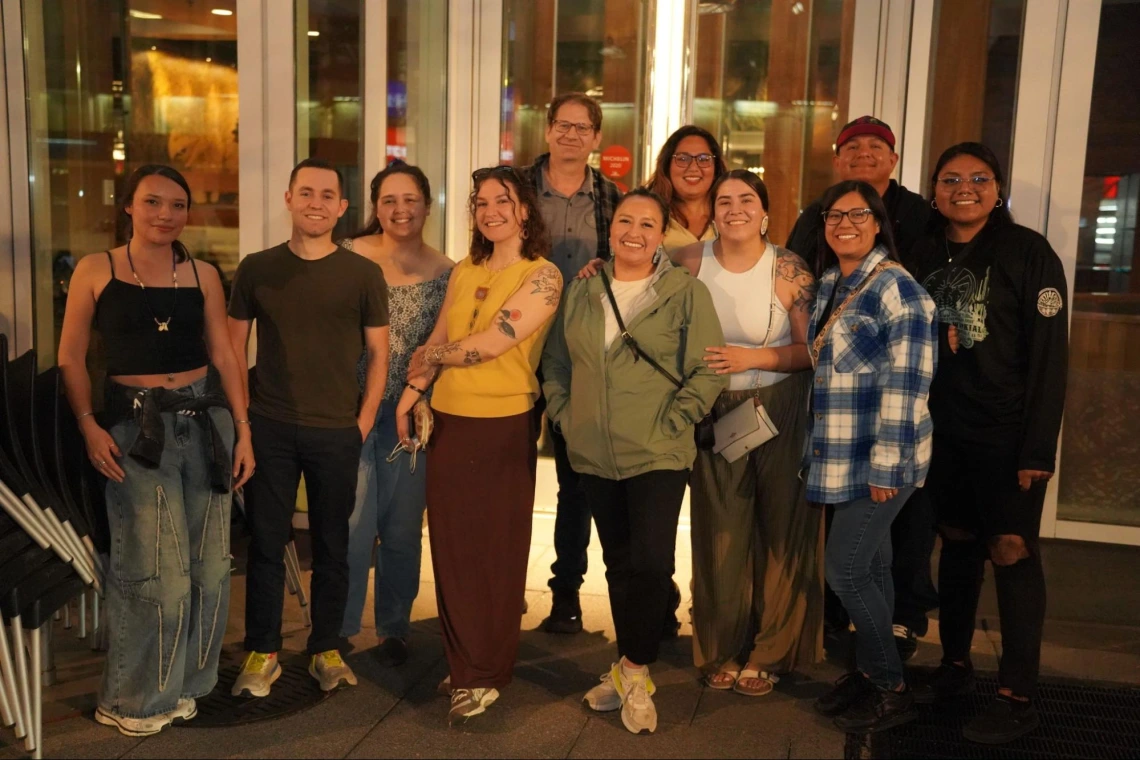
Above: Members of the 2025 ICP cohort and support team pose for a group photo outside at our culminating gathering.
Image courtesy of Olivia Miltner.
